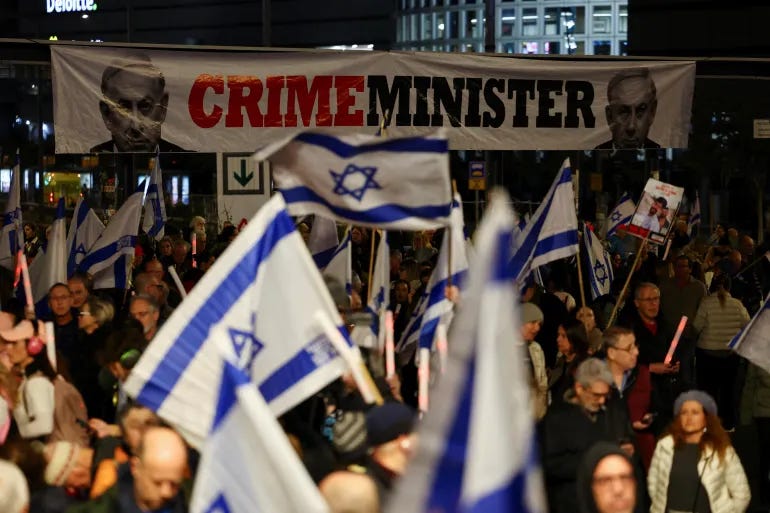Netanyahu’s Gamble: What the Israel-Gaza Ceasefire Means for His Political Future
Israeli PM Risks Losing Key Allies but May Still Navigate a Path to Survival
After more than a year of rejecting a ceasefire in Gaza, Israeli Prime Minister Benjamin Netanyahu has now endorsed a deal that could bring the devastating war to an end. The agreement, approved by his government on Friday, includes a prisoner exchange, a phased Israeli military withdrawal, and an end to hostilities in the besieged Palestinian enclave.
The ceasefire, set to begin on Sunday, marks a dramatic shift for Netanyahu, who has long insisted that the war would only end with the destruction of Hamas. Now, he faces fierce opposition from within his own government, particularly from his far-right allies, who see any pause in the conflict as a betrayal.
Backlash from the Far-Right
Among the fiercest critics of the deal is Itamar Ben-Gvir, the far-right National Security Minister, who has openly boasted about blocking previous ceasefire efforts. He has called the agreement “terrible” and vowed that his party will leave the government if it is implemented.
However, Ben-Gvir’s departure alone is not enough to topple Netanyahu’s coalition. To truly threaten his leadership, Finance Minister Bezalel Smotrich and his Religious Zionism party would also have to withdraw their support. Smotrich has indicated that while he backs the deal’s first phase, which focuses on the return of Israeli captives, he insists that the war must continue afterward. His party has threatened to resign if Israel moves toward a full ceasefire.
Trump’s Influence on the Ceasefire
The timing of the ceasefire is significant, coming just one day before the inauguration of U.S. President-elect Donald Trump. The Israeli far-right had hoped that Trump, a staunch ally of Israel, would take a hands-off approach, allowing them to push forward with settlement expansion and further military action in Gaza.
However, Trump has made it clear that he wants the war over before taking office, signaling that the U.S. may have pressured Netanyahu into accepting the deal. While this might initially seem like a political setback for Netanyahu, some analysts believe he could use it to his advantage, portraying himself as a pragmatic leader who acted in Israel’s best interests under U.S. pressure.
What Comes Next?
By agreeing to the ceasefire, Netanyahu may have secured himself short-term political stability, but serious questions remain about Israel’s long-term strategy in Gaza.
Who will govern Gaza?
This remains a key issue in the final phase of the ceasefire deal. Netanyahu has long insisted that Hamas must be eliminated, but with the war winding down, Israel now faces the challenge of determining who will take control of the territory.
How will Netanyahu maintain his coalition?
His far-right partners played a crucial role in bringing him back to power in 2022, particularly at a time when he was facing corruption charges and declining public support. If Smotrich and Ben-Gvir break away, Netanyahu may have to reshape his alliances, potentially seeking support from more centrist figures or even opposition members.
A Weakened Israel?
Beyond the political maneuvers, the war has had a profound impact on Israel itself.
Over 46,700 Palestinians have been killed, leading to accusations of war crimes and increasing international isolation for Israel.
The far-right has cemented itself at the center of Israeli politics, shifting the country further from diplomatic solutions.
Security concerns remain, with many Israelis questioning whether the war has achieved its objectives or simply prolonged the cycle of violence.
Israeli political scientist Ori Goldberg believes that despite claims of military success, the public mood has shifted.
“Israelis have been living in a kind of daze for the past 15 months,” he said. “For over a year, we were told absolute victory was just around the corner, but instead, we’ve seen destruction and death without achieving lasting security.”
Netanyahu’s Last Political Play?
Despite these challenges, Netanyahu may try to spin the ceasefire as a political victory, arguing that Israel has re-established its military deterrence and forced Hamas, Hezbollah, and even Iran to back down. By doing so, he could delay new elections and further solidify his grip on power.
However, the long-term consequences of the war—including Israel’s increasing militarization, deepening internal divisions, and mounting legal scrutiny—could ultimately erode his political future.
Whether Netanyahu emerges from this crisis as a survivor or a leader in decline will depend on how well he navigates the fragile political landscape in the coming months.
4o


